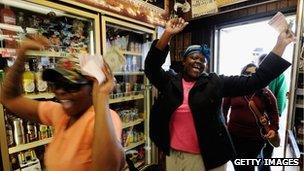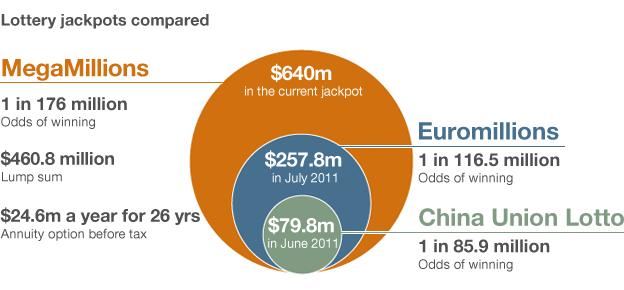Luck of the draw: Comparing lotteries
- Published
As lottery players in the United States cross their fingers and hope for a share of a record $640m (£400m) jackpot, the BBC looks at some of the world's biggest lottery draws.
El Gordo, Spain
Spain's Christmas lottery, known as "El Gordo" or "the fat one", is a national event. It has been going since 1812 and an estimated three-quarters of Spaniards and thousands of foreigners play each year.

People around the world try their luck in lotteries every week, despite long odds
The odds are good - around a million people walk away with cash prizes - and El Gordo is the world's biggest lottery in financial terms. It handed out 2.5bn euros last Christmas.
Unlike other lotteries, players do not choose numbers. They buy a ticket with a 5-digit number on and anyone who has that ticket when the the numbers are called - or, more accurately,sung out by schoolchildrenat a televised event in Madrid - wins a share of the prize.
Because of the nature of the system, tickets in a series are often sold by the same vendor, meaning the winners usually come from the same towns.
The draw is always held just before Christmas to offer people some festive cheer. In 2011's El Gordo, all 1,800 winning tickets were sold in Granen (population 2,100) in the arid and recession-hit Los Monegros area of Huesca province.
Winners scooped 400,000 euros per ticket. As the news came in, celebrating residents poured onto the streets to congratulate each other.
But spare a thought for Costis Mitsotakis. The Greek filmmaker was the only person in the 70-strong village of Sodeto, near Granen, not to win a prize. Apparently the homeowners' association forgot about him when they were collecting money for a share in a ticket.
EuroMillions, Europe
The EuroMillions lottery is held twice a week across nine European countries - Austria, Belgium, France, Ireland, Luxembourg, Portugal, Spain, Switzerland and the UK.
As the stakes are pooled from different countries, the prizes are often life-changing. The biggest winners to date areColin and Chris Weirfrom Ayrshire, Scotland, who bagged 185m euros (£161m) last July.

They said they were "tickled pink" at the news and planned to use the money to go travelling. The Weirs have recently found themselves caught up in apolitical spat, however, after they donated £1m to Alex Salmond's SNP party.
The Scottish first minister hosted the lucky winners at his official residence days before their donation last year - leading the Labour party to accuse him of misusing government resources.
The British have done particularly well in recent EuroMillions draws, taking five of the jackpots this year alone.
But France has had the biggest number of jackpot winners since the lottery started in 2004, with 55, followed by Spain (48) and Portugal (42).
Mega Milllions, United States
For the cost of a $1 ticket, one lucky Mega Millions player could be walking away with $640m on 30 March.
The way the lottery is set up, the winner will only receive the full prize if they agree to have it paid in instalments over a number of years. Otherwise, they can walk away with a $460m cash prize.
Players pay $1 (63p) for a ticket and must pick five numbers from 1 to 56, plus a Mega number from 1 to 46 to win the jackpot.
Since the lottery began in 1996, the biggest jackpot has been $390m in March 2007. That prize was split between two winners in Georgia and New Jersey.
But winners like Andrew Jackson Whittaker serve to show that money does not always buy happiness.
The West Virginia businessman won $315m in 2002, at that time the largest jackpot in history won by a single person. He had a happy family and a successful business when his numbers came up, but within five years he had been arrested twice, robbed several times and had around 400 legal claims against him.
He told ABC News: "You know, my wife had said she wished that she had torn the ticket up. Well, I wish that we had torn the ticket up too."